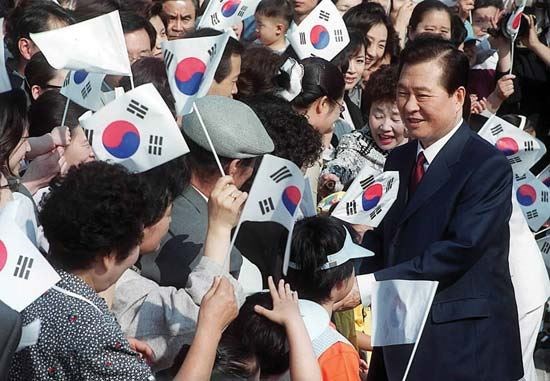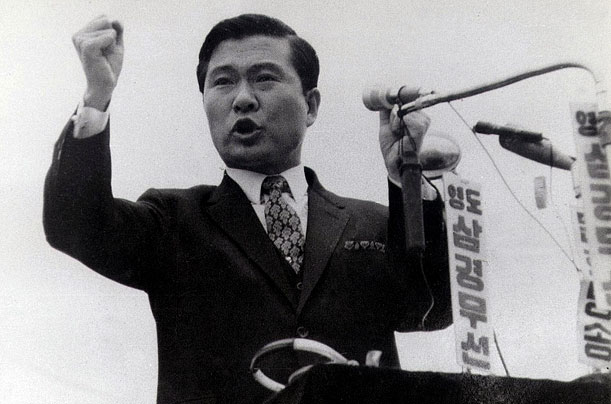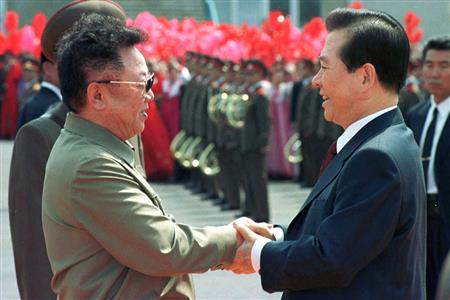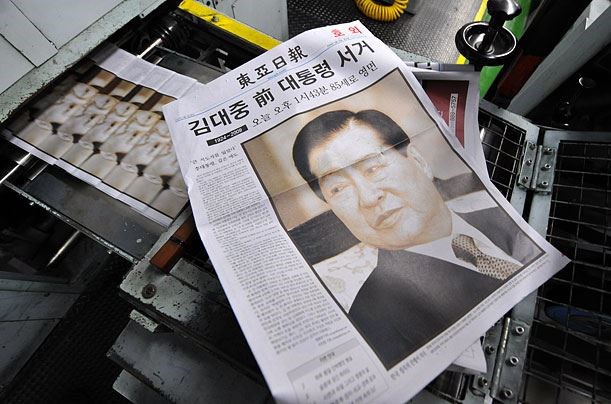 |
| Kim Dae-Jung, 2000 (https://www.britannica.com/biography/Kim-Dae-Jung ()) |
"Real heroes strive for the imperishable trophies. Their rules and goals are different. They live and work in the world, but they embrace the eternal values of love, joy, peace, patience, kindness, goodness, faithfulness, humility, and self-control. While fame, fortune, and power may come their way, attaining them is not their goal" (Harper). In the article "How we choose our Heroes", Charles Harper identifies and defines the qualifications of a hero in his own personal beliefs. Consequently, he emphasizes the importance of choosing an appropriate hero, "'Tell me who you admire and I'll tell you who you are." According to this logic, choosing heroes is important because who you choose often determines the character of a person and a people." (Harper) It is evident that exploring and finding your own hero is a self-defining task, and that it reflects the morals and traits of an individual. Especially with the challenges that we as members of a society face, finding inspiration and a rationale to work towards is often the motivation that keeps all of us moving. However, heroes are not all sorted under one consensus of criteria between every single individual or society, as different people come from different backgrounds, thus creating differing morals. Heroism can be found in a poor mother working day and night shifts to provide her family, or it may be seen in a star celebrity donating millions towards charity. However a shared trait within all heroes is the inspiration that they provide to everyday individuals. I believe that a hero should demonstrate traits that can be modeled by their supporters and an inspiration to viewers and people around them.
Born on December 3rd, 1925, Kim Dae-Jung was the son of a common farmer and his wife. With a poor background, he attended public schools and had a stereotypical farmers "Mr Kim was never expected to become president. He was doubly an outsider: a poor farmer's son from the rocky, neglected south-western coast, and a "street-fighter" whose purpose was to agitate, brewing up seditious pamphlets in kitchens heady with kimchi and kerosene, rather than to govern the country" (Kim Dae-jung). Despite these disadvantages, Kim persisted and continued to work hard in school and his studies. "Kim became a symbol of resistance against political repression in Korea and a spokesman of the Korean people for the struggle for democracy and human rights. He was an internationally renowned figure as a result of the world-wide sympathy and support he was able to garner for his courageous political stand. In 1959 he led the National Coalition for the Protection of Civil Rights in Korea. In 1981 Kim received the Austrian Bruno Kreisky Award for Service in Human Rights, and in 1983 he was awarded an honorary Doctor of Laws degree by Emory University. He received an honorary citizenship award from Memphis, Tennessee, and also from Nashville, Tennessee, respectively in 1966 and 1983." (Kim Dae-jung.) Heroes need to exemplify a strength in morals, keep their integrity, and also have sympathy for everyone. Even their most hated enemies. Kim Dae-Jung is a hero for the ages because of his perseverance in the face of death and his sympathy to sworn enemies.
 |
| Leader of the Pack (http://content.time.com/time/photogallery/0,29307, ()) |
Kim was often persecuted by his political allies for his representation of democracy in a corrupt South Korea. Going head to head with some of the most powerful military giants in the country, Kim fought for a fair, honest, and non-oppressive South Korean government. His fight for an insurgency started very poorly, and the consequences would prove to be fatal. "Throughout his political career Kim has faced numerous challenges including assassination attempts, kidnapping, torture, imprisonment, house arrest, and other forms of harassment. These experiences strengthened his will, allowing Kim to develop his political philosophy and understanding of human nature and Korean society. In 1976, a group of religious leaders, professors, and students signed a statement urging Park to step down. Riots followed in protest against the arrest of dissident leaders, including Kim. He was later sentenced to an eight-year prison term for advocating the overthrow of the government. Kim was ultimately released, but re-arrested in 1980 and sentenced to death by hanging. This brought an immediate outcry from the international community, which led to his release in 1982. Kim arrived in the United States for medical treatment and became a research fellow at Harvard University in 1983" (Kim Dae Jung, President of Republic of Korea). With the fight just beginning, Kim had slipped on his own shoe lace and already fallen to the crippling power of the South Korean Regime. Luckily, American spectators felt sympathy for the advocate and welcomed him to their country, where he would be able to heal and recover for a new beginning. His second chance came, and it came very quick. He found himself in the country again two years later, and someone had planned to kill him the old-fashioned way. With a stone. "Two years later, still serving in the opposition party, Kim met with a fellow party leader for a secret lunch at Seoul's Grand Palace Hotel on August 8, 1973. Afterward, Kim was abducted in a hallway, beaten, rendered unconscious with a rag soaked in chloroform, bound and gagged, blindfolded, and whisked off in a car. The next night he found himself on a Korean freighter. His captors bound him again, taped his face except for air holes around the nose, and tied him with ropes to a traditional Korean funeral plank for a burial at sea. As weights were hung from his wrists, Kim, a devout Roman Catholic, began to pray. Suddenly, he could hear aircraft above, and the ship made a sharp turn, throwing Kim to the deck. Many years would pass before Kim and the world would learn that Korea's Central Intelligence Agency had masterminded the kidnapping, and that the United States had stepped in to try to rescue him. The details are still sketchy, however, as to where the planes that saved him came from" (Dae Jung Kim). With two attempts at his head recorded in history, a spectator would've had the right to assume that Kim would give up, and seek a peaceful and non-eventful life as a private citizen. Yet he persevered, and continued to fight for political freedom for his country, and endured the consequences. "In prison Kim endured freezing cells and torture, but he also used the malevolent circumstances to further his education. In fact, as Nicholas D. Kristof related in the New York Times, Kim "sometimes complains that the downside of being released from prison was that he lost his best time to read and reflect, although he still works from 6 a.m. to midnight each day and always makes time to read books--in Korean, Japanese and English." Kim learned English and read voraciously during his time in prison and under house arrest, absorbing the works of Mencius, Plato, Bertrand Russell, and Abraham Lincoln. He also became an avid botanist. One of the men hired to spy on him during his house arrest was Lee Yeol, a retired police officer. He was instructed to record foreign journalists' visits to Kim and to root through his garbage, which is how his opinion of Kim began to change. "One day, I was looking through Kim Dae-jung's trash, and I found a piece of his writing entitled 'Resolving Regional Hatreds,'" noted Lee in the New York Times. "I was really impressed. I thought he was a genius." Lee added, "I used to look forward to going through his garbage, in hopes of finding some of his writings." Family members must have figured out that Kim was being watched, Lee concluded, because they quit discarding such writings. "I was really disappointed," he remarked" (Dae Jung Kim). His stubborn and resilient attitude continued to propel him towards his goal, and he picked up many valuable skills in the midst of his suffering. His moral beliefs were strongly formed around his Roman Catholic faith, and he began to shape his view and definition of freedom for the Korean People. Kim was officially a danger to the iron-fists of the government, and with many prosecutors coming for him, the South Korean people began to bolster his fight for democracy.
 |
| North Korean leader Kim Jong-il and South Korean p (http://atlanticsentinel.com/2013/12/south-korea-sh ()) |
Kim Dae-Jung began to grow in popularity amongst the South Korean citizens who were fed up with corruption and ineffective leaders. While Kim's stubborn and resilient attitude towards his goals was well-known and respected, he would show to have a soft side and sympathy for even the most hated of enemies. "Another foreign policy issue that has brought much criticism is Kim's attempt at reconciliation with North Korea. In the past, the two countries severed ties completely during the Korean War and have not allowed family members to contact one another or even exchange mail. Kim has pressed for reunions with separated family members and plans to open the airways, allowing citizens access to North Korean radio. He will even permit private companies to invest in the North. In June 2000, Kim Dae Jung held a much publicized summit with his counterpart, Kim Jong II. Many believe that the meeting reduced mutual suspicions and established the groundwork for an era of cooperation on humanitarian and economic issues. In August 2000, a North Korean plane touched down in South Korea for the first time in 50 years. The plane carried 100 families who had not been able to see their relatives in the South since 1950" (Kim Dae Jung, President of Republic of Korea). Kim shocked the world with what he had done; he radiated sunshine and happily exchanged with the world's most renowned narcissist and hippie that happened to be a major leader. His sympathy and openness towards the struggling counterparts in the North struck down a barb-wired fence and had allowed for re-negotiations between the two countries. Furthermore, his sympathy extended to his prosecutors, such as former president Chun Doo-Hwan, who had ordered his execution many years prior."His readings of Mencius, an ancient Confucian philosopher (prison affording much time for reading, from Kant to Plato to J.K. Galbraith) convinced him that a ruler too was an envoy from Heaven, sent to bathe his people in charity and justice. That was why when he at last became president, in 1998, he invited to his inauguration the men who had wanted him dead, and forgave them. And that was why on June 13th 2000 he found himself on a red carpet in Pyongyang giving a bear-hug and an air-kiss to Kim Jong-Il, North Korea's dictator, whose quiff of hair stood up with the shock of it. Mr Kim's "sunshine" policy towards the communist North meant not just switching on a light or opening a door but, after Aesop's fable, so flooding a man with warmth and love that he would spontaneously strip his coat off, disarmed" (Kim Dae-jung). His past experiences with Americans, his Catholic Faith, and the Confucian teachings he had read in prison prompted him to walk the path of empathy and excuse his prosecutors. While the Korean people criticized him of his sympathy, he continued to show how devoted and passionate he was as a leader for his people.. Kim Dae Jung was an exemplary leader, and he didn't forget the morals that had initially propelled him to his position as president.
 |
| (http://content.time.com/time/photogallery/0,29307, ()) |
His resilience saved him from death and his sympathy earned him world fame. Kim earned an impressive and respectable reputation amongst his people. Through his perseverance and strong morals, Kim succeeded where anyone else would've failed. "Having endured political persecution and then being democratically elected, Kim has earned the moral authority to govern, something many of his predecessors lacked. He is considered incorrigible, charismatic, politically astute, and courageous. His speeches are known for their dynamic quality and passion. Clearly, he has the courage and ability to mobilize public opinion in this crucial stage in Korean history. Untainted by the previous regime's corruption, Kim can legitimately undertake campaign finance reform and much needed economic reform. His recent pardons of Chun and Roh brought criticism from some supporters but represent the first attempt at healing national political divisions" (Kim Dae Jung, President of Republic of Korea). As Charles Harper states, "Real heroes strive for the imperishable trophies. Their rules and goals are different. They live and work in the world, but they embrace the eternal values of love, joy, peace, patience, kindness, goodness, faithfulness, humility, and self-control. While fame, fortune, and power may come their way, attaining them is not their goal" (Harper). Kim Dae-Jung strived for a successful Korea, not just South Korea. He had already obtained his prize of resilience and empathy, yet he kept progressing for more. Not just for him, but for his people. Works Cited "Dae Jung Kim." Newsmakers, Gale, 1998. Research in Context, go.galegroup.com/ps/i.do? =MSIC&sw=w&u=powa9245&v=2.1&id=GALE%7CK1618001394&it=r&asid=4084ca8edc49b9032351b8975c6caa5. Accessed 3 May 2017. "Kim Dae Jung, President of Republic of Korea." Worldmark Encyclopedia of the Nations, 11th ed., vol. 6: World Leaders 2003, Gale, 2002. Biography in Context, link.galegroup.com/apps/doc/K2303600126/BIC1?u=powa9245&xid=64caf16b. Accessed 1 May 2017. "Kim Dae-jung." Encyclopedia of World Biography, Gale, 1998. Biography in Context, link.galegroup.com/apps/doc/K1631003611/BIC1?u=powa9245&xid=80e8d626. Accessed 1 May 2017.
Page created on 5/17/2017 12:00:00 AM
Last edited 5/17/2017 12:00:00 AM
